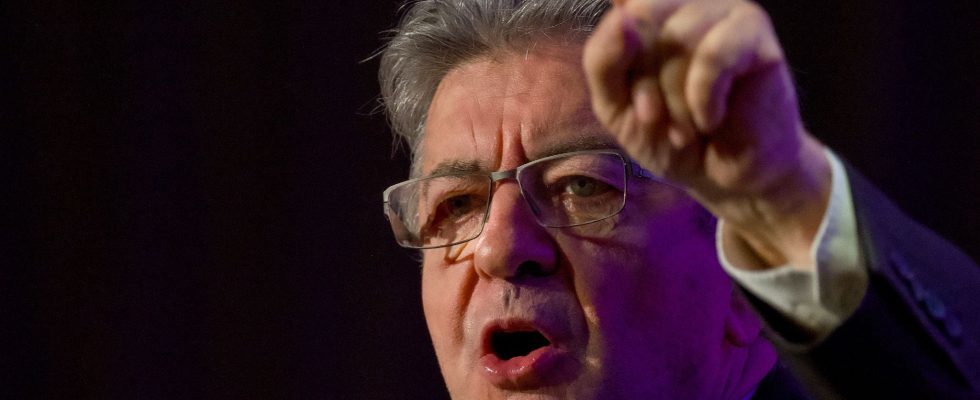The left loves nothing more than waking up its dead to make them speak. If it’s not François Mitterrand, it’s Michel Rocard or Léon Blum, sometimes Léon Trotsky or Karl Marx for the most daring, and Jean Jaurès ad nauseam since Vladimir Putin’s Russia launched war against Ukraine in 2022. Here is the socialist with the shaggy beard resurrected on the stage of the European elections, thanks to Emmanuel Macron evoking the possibility of sending Western troops to support Kiev.
Irony of history, Insoumis and communists claim to be heirs of the same Jaurès to differentiate themselves from their late comrades of the Nupes, in particular of the Socialist Party, and to fuel, even more, the ABC of the irreconcilable lefts. By declaring that “France should have completely switched to a war economy”, Raphaël Glucksmann has become the new target of LFI and the PCF who accuse him of advocating “cobelligerence” against Russia, and therefore of betraying the pacifist ideal. jauressian.
The dead speak
It was Antoine Léaument, LFI deputy and close to Jean-Luc Mélenchon, who wrote to Glucksmann: “The A booklet to finance bombs rather than housing, is it a socialist program? I’m dreaming! Jaurès must turning in his grave.” It is his comrade Éric Coquerel who challenges Olivier Faure by asking him if it is indeed this “go to war” who will lead the socialist list; it is the head of the communist list in the European elections Léon Deffontaines who apostrophizes his socialist adversary with “We are not at war against Russia”, also quoting Jaurès: “We do not wage war to get rid of war !” On the left, everything is good to seek to differentiate itself from its comrade in the campaign and international questions are the most appropriate. They had been skillfully swept under the rug during the negotiations leading to the Nupes agreement in spring 2022. It was therefore not surprising to see the left-wing coalition shattered on the altar of the Hamas terrorist attack in Israel on October 7 and on the conflict between Russia and Ukraine recently.
The advantage with the dead, in politics, is that they are no longer there. Jaurès, like de Gaulle, was never so talkative, but have those who exhibit him today really read him? In a 2013 essay, historian Vincent Duclert recalls that the evocation of Jaurès as the champion of pacifism is historically unfounded, nothing more than a myth exploited by his contemporaries. “He did not lock himself into a dogma of peace, but he proposed an affirmation of democracies and their implacable defense. He established the duty to think about the war of tomorrow and the army of today in major political responsibility”, writes Duclert.
Patriotic silence
With all due respect to the rebels and the communists, Jaurès did not reject war in principle and accepted it even if it had to be waged against the tyrannies which threatened democracy and the Republic. While Bismarck and the situation in Germany were being debated at the Assembly in February 1887, Jean Jaurès wrote in The Dispatch : “France remains, as it must remain, awake, attentive, ready to rise to the last man for the defense of the soil, but it has almost complete confidence in the maintenance of peace.” And to bow to the “patriotic silence” and the common opinion of a political class approving the new credits for the French army: “If Germany attacked us because, following its example, we perfected our rifles, it is that in truth any pretext is good for her, and then she will easily find another. We have said very loudly, and everyone knows that we do not want war; what is the point of repeating it every morning? No bravado, but no panic; dignity is also part of prudence.”
Jean-Luc Mélenchon himself has never hidden his desire to be considered the Jaurès of his century. When L’Express asked him whether, at the height of his 70s, the idea of never leading France worried him, he retorted bravado: “Jaurès neither.” And like the icon of the left of the last century, he was not always opposed to war. His pacifist caution today on arms deliveries to Ukraine stands out from his criticism, ten years earlier, targeting François Hollande on the same war terrain. In 2014, he denounced the person who “ridiculed France” by not delivering the Mistral helicopter carriers ordered by Moscow. “This vague and hypocritical diplomacy is only a screen for the odious alignment of our country with the warlike policy of the United States against Russia,” annoys the then head of the left party.
In March 2011, in the columns of Release, Jean-Luc Mélenchon follows in the footsteps of Nicolas Sarkozy, and supports the French military intervention in Libya. “We must break the tyrant to prevent him from destroying the revolution,” he says. “There is of course a risk of escalation, but I would fear more the risk of massacre!” Five years later, on February 20, 2016, on France 2, guest on the show We are not in bed, he is questioned about Russian bombings to help Bashar al-Assad in Syria. “Putin, are you for what he is doing right now in Syria?” asks Léa Salamé. “Yes […]. I think it will solve the problem. Eliminate Daesh”, replies Mélenchon, who affirmed a little earlier: “We have no friends, we only have interests.” In contrast to a Jaurès who only accepted war to defend values of the Republic and democracy. One wonders if he, his rebellious flock and the communists of Fabien Roussel have forgotten the words ofInternational : “Peace among us! War on tyrants!”
.
